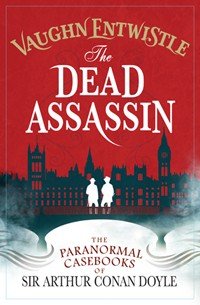
It may be 15 months since Titan Books published The Revenant of Thraxton Hall, the first of the paranormal casebooks of Sir Arthur Conan Doyle, but in Vaughn Enwistle’s Victorian literary universe, only a few short weeks have passed.
Doyle is spending most of his free time in London. His wife, Louise, remains behind in the family home in Sussex slowly succumbing to tuberculosis. Doyle suspects her end is now near. She has not left her bed in weeks. In his grief, the writer has regained his interest in the spirit world and is now active in the Society for Psychical Research.
It is here that he has met, and quickly become besotted with, a young medium called Jean Leckie. Their tentative romance, something that Doyle is guilt-stricken over, is interrupted one night by murder. Lord Howell, the secretary for war, is dead at his home address. Whoever murdered him seems to have the power of ten men. The heavy front door has been smashed in, Howell has had his neck not just broken but twisted 180 degrees, and the killer managed to leave the scene despite having been shot five times.
Detective Blenkinsop is baffled and the continuing heavy fog that has London almost at a standstill is hampering his investigation. Doyle, and his literary friend Oscar Wilde, have helped Scotland Yard in the past and Blenkinsop would welcome their keen observations again.
The friends discover the murderer around the corner, having seemingly finally succumbed to his injuries. Blenkinsop is able to confirm the identity of the corpse as that of a local petty criminal. However the policeman’s troubles continue. The corpse disappears during the fog preventing a thorough examination, and he is convinced it was the body of a man he himself witnessed hanged two weeks ago.
Doyle is determined to help Blenkinsop with his investigation but soon an even more important person has called on him for assistance. Buckingham Palace, represented by the mysterious Mr Cypher, wants to put Doyle’s analytical skills to use. There have been a number of anarchist bombings within the capital, so far relatively trivial in nature, but there are whispers of revolution and an attempt on Queen Victoria’s life cannot be ruled out.
When a second prominent public figure is murdered in the same gruesome fashion, revolutionary graffiti discovered at the crime scene appears to link the murders with a treasonous plot.
Historical crime fiction set in the Victorian era seems to be increasingly popular. By taking real life literary figures, particularly ones like Doyle and Wilde who have a degree of personal tragedy attached to them, Entwistle has found a way to make his stand out from the crowd. In Entwistle’s previous book, it was Wilde who stole the show, and I am pleased to report that he is placed front and centre in The Dead Assassin. His nationality and sexuality gave him outsider status in Victorian London, something the author uses to give depth to his characterisation.
The occasional miss-steps in plotting that marred his debut have been ironed out. However the marvellous gothic atmosphere from that first book is missing a little. Perhaps it was just too hard to recreate that when the milieu has moved from a dilapidated country house to the big city.
Overall though, this is a strong sophomore effort, and bodes well for his next book, The Angel of Highgate, due at the end of the year.
If you enjoy this, you may also enjoy Michael Kurland’s Who Thinks Evil.
Titan Books
Print/Kindle/iBook
£4.00
CFL Rating: 4 Stars









